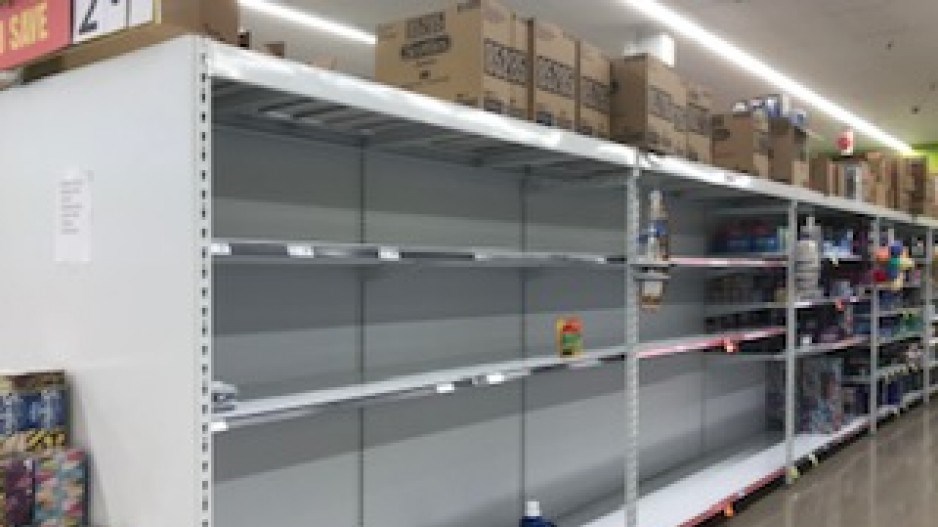Sixty per cent of businesses in B.C. expect a 50 per cent decline in revenue from COVID-19 containment measures, according to a survey by the BC Chamber of Commerce.
The BC Chamber launched a COVID-19 survey of B.C. businesses Friday and got more than 2,000 responses.
Eighty-one per cent said their businesses are being affected, either by government or voluntary public measures (avoiding restaurants, pubs, movie theatres, etc.), and close to 90 per cent said they expected to experience impacts in the near future. Sixty-one per cent said they are seeing meetings and events cancelled.
“Eighty-one per cent said we’re seeing a drop in revenues, business or deal flow,” said BC Chamber of Commerce president Val Litwin. “Over 60 per cent of those responding think their revenues will drop by 50 per cent or more. Business is being cut in half.”
There is little question that Canada now faces a recession. Stock markets around the world resumed a freefall Monday, March 16. The S&P TSX Composite Index fell 10 per cent Monday, and copper prices fell 5 per cent on news that industrial growth in China is down nearly 14 per cent in January and February. Even gold prices fell, as investors were forced to sell gold stocks to meet margin calls.
Asked what businesses want to see from governments in terms of support, Litwin the top response in the chamber survey was a request that the federal government be flexible on tax remittances and eliminate penalties for late remittances.
They also want to see the government work with banks to provide business with zero interest loans, loan guarantees and lines of credit. They also want to see enhanced access to unemployment insurance for employees that have to be laid off.
One of the problems for some non-salaried employees is that they are not getting called into work at some businesses, like restaurants, and yet they haven't been laid off yet. So they are losing income without being able to apply for employment insurance benefits.
"I'm hearing that restaurants and bars aren't able to call staff in because the work is not there," said Bridgette Anderson, president of the Greater Vancouver Board of Trade. "But they're not really laying them off yet, so these employees are not able to access EI benefits until they get the word that they are, in fact laid off."
As for the containment measures announced Monday by the federal government, Litwin said travel restrictions that were announced do not appear to apply trade and commerce.
“I got the sense from the prime minister today that they’re going to do absolutely everything to keep those essential supply chains moving – important inputs into the manufacturing, for example, of medical equipment," Litwin said.
“I heard today that international travel is going to be restricted to four Canadian airports. I didn’t hear that necessarily about trade and commerce. I think that would be the implication that we have to keep the economy moving here.”
B.C. Health Minister Adrian Dix expressed concern that the federal ban on international travel doesn’t apply to Americans. But Litwin agrees with the special exemption for Americans.
“Our economies are so intertwined, it requires maybe some different filters and considerations,” Litwin said.
Given the importance of trade between Canada and the U.S., Tom Koch, adjunct professor at the University of BC’s Department of Geography, doesn’t think closing the border to the U.S.would be a very good idea.
“It would be economically and politically disastrous to try to close the border with the United States,” he said. “And the border is so porous, so long, it would probably be futile. So at present and in an evolving situation, I think it's the best that could be done.”
Despite assurances that supply chains should not be disrupted, panic buying has resulted in grocery and big box stores running out of toilet paper, diapers and hand sanitizer.
Some stores have begun to place limits on the number of items customers can buy, but even with those limits, so many people are stockpiling that many stores have run out of those items.
Asked if she thinks the government may need to step in with some form of rationing to prevent hoarding and profiteering, Anderson said she thinks that may become necessary.
"I think all of this is just evolving so rapidly that it's hard to know where this could go next," she said. "But as we continue on, as things continue to change, the government may need to take more measures and more restrictions."



